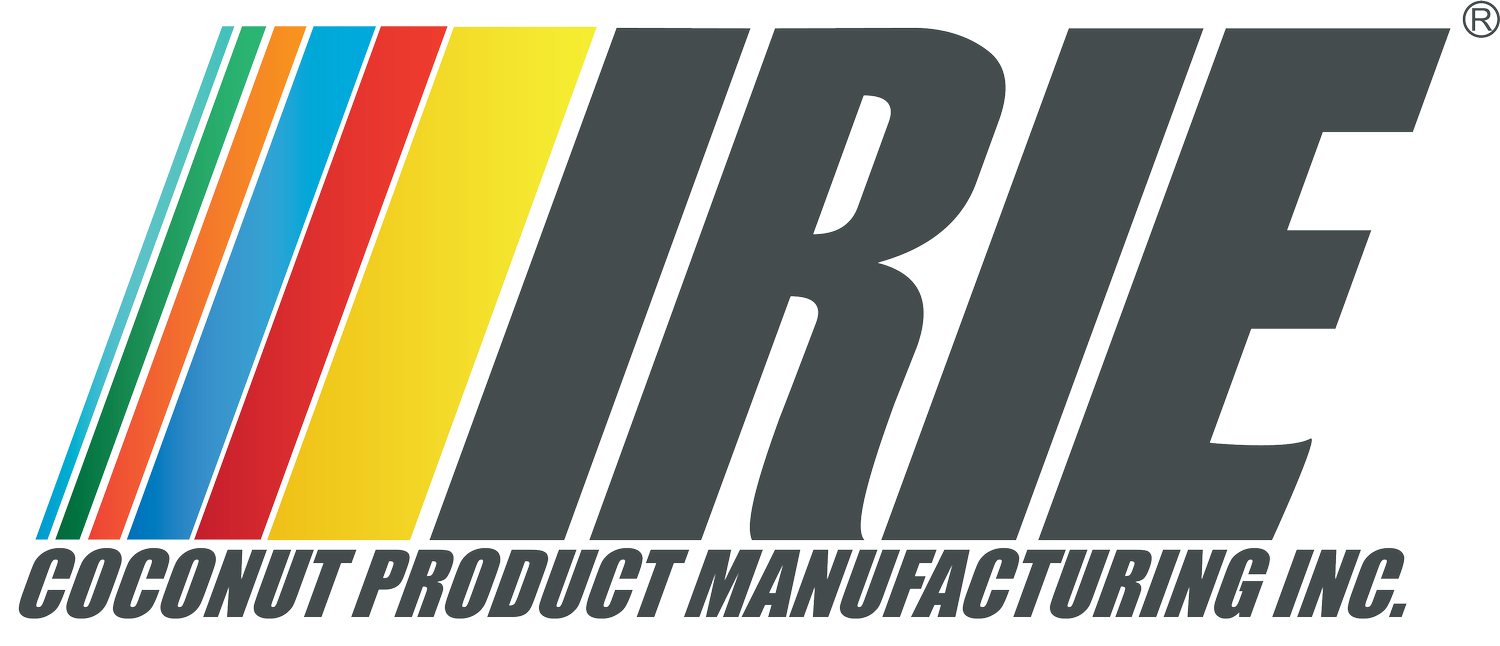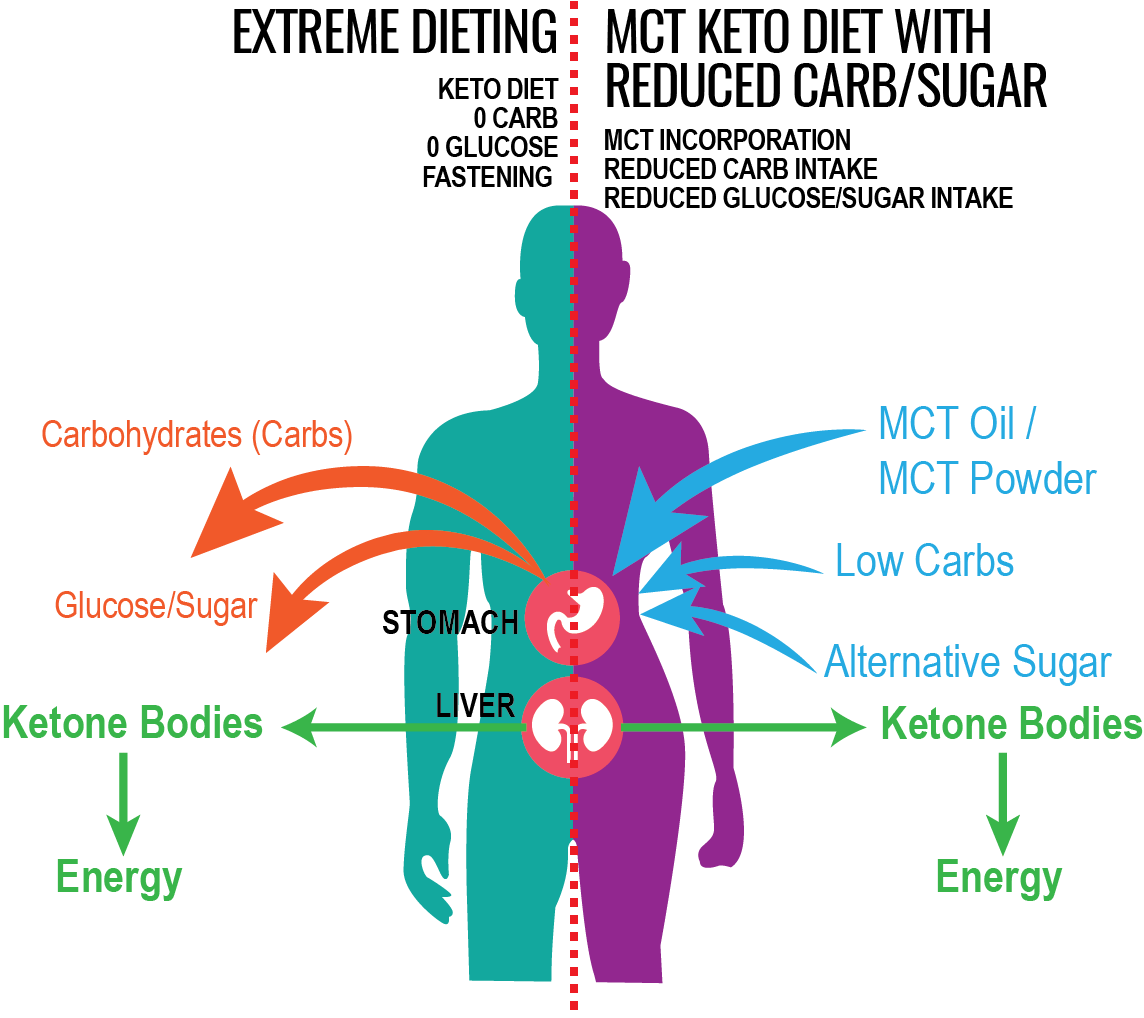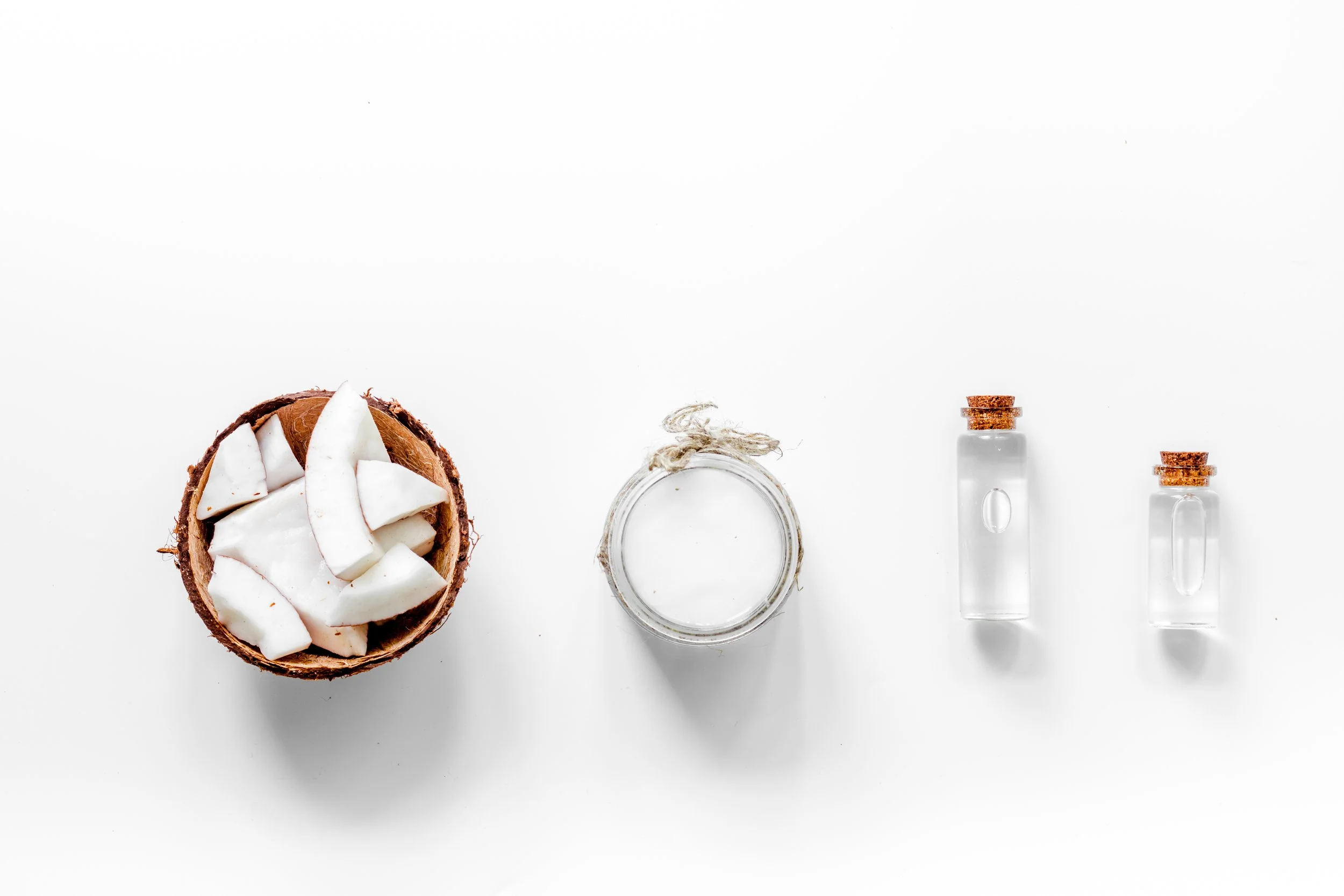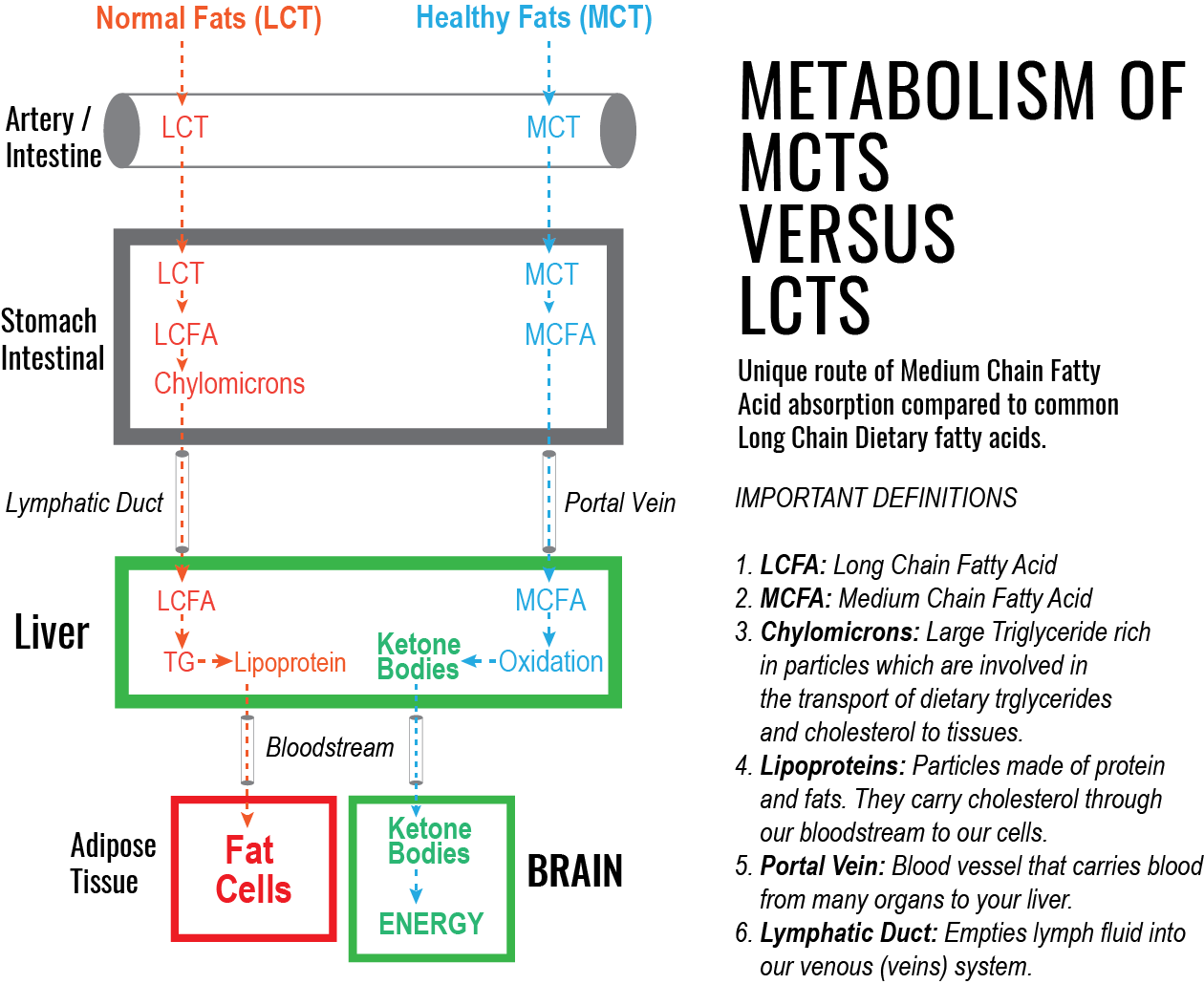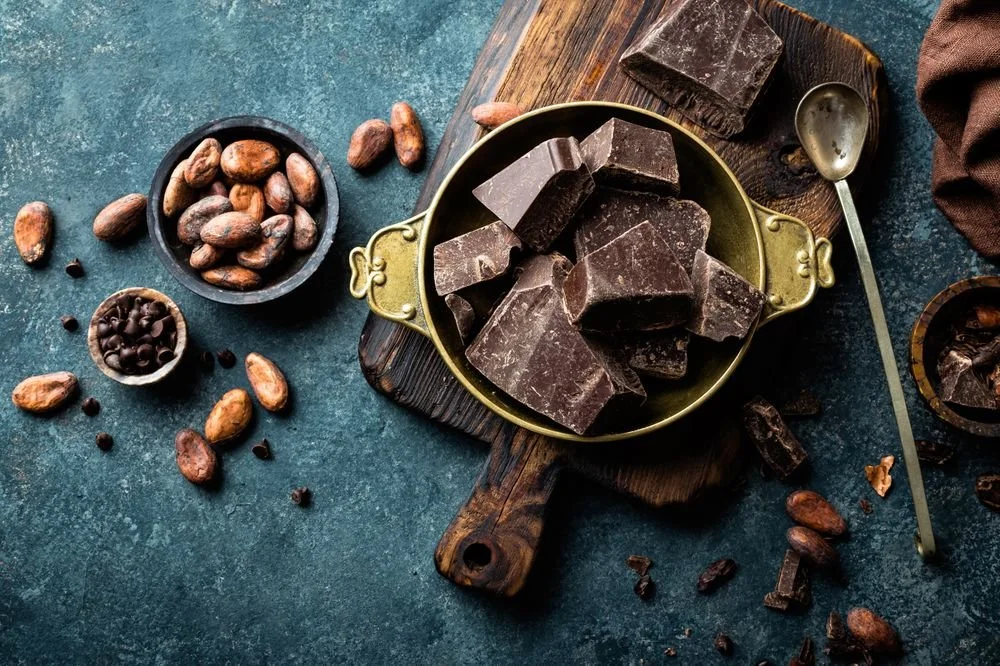KETONES & MCT: The long hard truth
Ketones are a type of chemical that our liver produces when it breaks down fat.
Our bodies naturally use ketones for energy typically during fasting, long periods of exercise, or when you don’t have as many carbohydrates. Normally, the cells in our bodies use glucose (sugar) for energy. You get glucose from eating carbohydrates or sugar-based foods. If our cells don’t get enough glucose and/or carbs, our bodies will break down fat for energy instead.
This process produces ketones, and our bodies go into a state that’s called “Ketosis”.
Does this mean the more ketones I generate, the more I lose weight and generate my own natural energy??
- ANSWER: NO. Ketosis is like an Automatic emergency light. Comes on during emergencies and does not constantly stay on.
- Constantly having your Ketones at a high % everyday in our bodies is dangerous.
There 3 types of energy producing Ketones we produce;
Acetone - The simplest and smallest Ketone
Acetoacetic Acid – Simple beta keto acid that is unstable and weak.
Hydroxybutyric Acid (3HB) – Strong acids and the most abundant in mammals. 3HB is the major ketone body that is distributed in the human brain and primary energy source when glucose is absent.
An unusually HIGH % of Ketones when managed incorrectly is bad. With the limitation/removal of Sugar/Glucose/Carbs for people with Diabetes or sensitive to a lack of sugar this can lead to another type of diabetes called Diabetic Ketoacidosis (KDA) – a life threatening medical emergency.
Too many ketones can make your blood acidic and toxic. So our bodies naturally exit excess Ketones through our urine.
As is, individuals are able to naturally achieve ketosis by one or a combination of the following;
Intermittent Fasting
Bring on the fat; The Keto Diet allows many people to eat the types of high fat foods that we normally enjoy like; Red meats, fatty fish, cheese and butter, while still losing weight (or so we think).
Cut out the Sugars. No more ice cream, no breads, or pastas.
The above methods have shown natural occurrences and increase in ketones however they do pose problems with consistency in long term application such as:
Difficult to sustain; Due to the stringent food restrictions, many find the keto diet hard to stick to.
Fasting (monthly) is a difficult task be consistent. Ketone production is not consistent in this state and can lead to further problems if Ketone production tends to be higher than normal with no real nutrition in our bodies to offset the give and take.
Calorie Depletion and Nutrient Deficiency. Because the keto diet is so restricted, you’re not receiving the nutrients – vitamins, minerals, fibers that you get from fruits, legumes, vegetables and whole grains. Bad Fats in Practice The number one problem and misconception that people make are the intake of HIGH fatty foods.
This leads people to assume eating anything that is high in fat is a positive for generating Ketones. When in truth, eating meals that are high in unhealthy fats daily for the sake of our bodies burning that fat instead of sugar, is just as bad as normally eating unhealthy fatty foods and reducing sugar intake.
So a question comes to mind;
What difference does MCT OIL make with Ketone production?
Before we answer this question; we must understand there are two types of fatty acids;
LCT (long chain fatty acids) and MCT (medium chain fatty acids)
LCTs are long chain fatty acids that digest much more slowly and are found in almost every food we eat;
Butter (Lactose based)
Beef
Pork
Animal products
Olive Oil
Palm Oil
Soy
Corn and Sunflower Oils
In a nutshell, because of its “long” chain composition. LCTs are much slower to digest in our bodies and easily stored in our fat cells. This means we have to put in more physical work to burn these fats. Because of the long “storage time” our bodies would not need to produce Ketones as the LCTs serve as the first line of energy processing.
MCTs have a “shorter” chain length and are largely found in;
Coconut Oils
Palm Oils
Coconut Based MCT having the highest % of MCTs and being the most sustainable choice available.
Studies have demonstrated that MCTs are not efficiently stored in our body compared to LCTs, so after we consume MCTs, they go directly to the liver to be burned for energy and turned into Ketones. This makes certain MCT oils beneficial as an instant source of energy making it unnecessary to store unhealthy fats and avoid eating super higher sugar/glucose based foods. Normally, the liver only produces ketones when food/sugar/glucose/carbohydrates intake is very low or, absent. However, by incorporating MCT Oil in our daily diet, while maintaining a healthy carb/sugar intake; ketones can still be produced without the need to go to extreme lengths like fasting or, a rigorous “Keto Diet”.
One important caveat to note is that;
In order to sufficiently elevate blood ketones into the “nutritional ketosis” range (0.5mmol/L) for 2-3 hours, a person needs to consume at least 14g of MCTs in a sitting. And in order to continue to keep ketone levels elevated they would need to keep consuming MCTs every 2-3 hours.
Consuming MCTs to increase blood ketone levels is not a guaranteed method for speeding weight loss and excess MCT consumption may lead to stomach discomfort like diarrhea.
So who actually benefits from MCT intake and the Keto Diet? The “BIG PICTURE”
The keto diet has been proven to help reduce seizures in pediatric patients with epilepsy and are currently being studied for the treatment in patients with early stages Dementia/Alzheimer's disease.
Alzheimer’s disease impairs your brain's ability to use sugar. An MCT ketogenic diet offers an alternative energy source: ketones. This allows brain cells to survive better. It also blocks a receptor in the brain that causes memory loss.
There are 3 chemicals our bodies produce, called neurotransmitters, that can have positive effects on our brains if their outputs can be controlled. They are;
Histamine: Involved in immune responses between our gut and our brain. High levels of Histamine may lead to diarrhea, headaches or skin irritation.
Glutamine: Excess glutamate in the brain is believed to cause Anxiety disorders and brain injuries.
Serotonin: Too much serotonin causes signs and symptoms that can range from milk to severe (muscle rigidity, fever and seizures).
To normal people these 3 neurotransmitters must be maintained through normal effective diet and exercise to keep balance.
For individuals with Epilepsy, or irregular brain activity in Dementia/Alzheimer’s patients; diet/exercise is not as accessible for them as other people. So the levels of the 3 neurotransmitters must be controlled lower than that of a normal person’s levels.
Studies were conducted on a group of dogs who experienced frequent seizures. These dogs had their urinary concentrations of histamine, glutamate and serotonin significantly reduced under MCT consumption. Their seizure frequency was reduced by greater (>) than 50%. Read More here
Metabolic pathways affected by dietary MCT consumption are still poorly understood so this poses the obvious question;
Is MCT a good treatment for treating my Epilepsy/Seizures?
In the Short term; For example; In a moment of a Seizure, NO. Its still recommended to take your doctor’s prescription medicine or to Immediately seek medical treatment.
MCT is not proven to cure or prevent Individuals having an Epilepsy, with a history of Seizures or, treat seizures in the moment of.
In the Long term; MCT Oil supplementation in addition to a Keto Diet may provide better seizure control in some patients.
Can MCT Improve my memory? Can it treat Dementia/Alzheimer’s?
Research has found a direct link between sugary foods and an increased risk of Alzheimer’s.
A 2021 study that followed 1,865 people over 16 years found a higher risk of Alzheimer’s, all types of dementia and stroke in people who consumed the most sugar, especially in the form of drinks. Click to learn more
MCT is not proven to prevent, treat or cure Dementia/Alzheimer’s, yet.
What we do know for sure are the proven benefits of MCTs. MCTs are a source of Ketone bodies that are absorbed and metabolized faster than Long chain fatty acids.
Studies have shown the overall decline of brain energy metabolism in Dementia and AD patients is mainly due to glucose hypometabolism, while brain ketone metabolism remains unwounded.
Supplementation with MCT as a Ketone producer + an alternative Fat source to LCTs will constitute Ketone production to provide a direct source of energy for the brain cells.
In the Long Term: MCT Oil supplementation along with keto diets, and a significant reduction in sugar/glucose foods, may help prevent and avoid the early stages of Dementia/Alzheimer’s.
Supplementation for patients currently in the early stages may help in preventing them from entering extreme stages of the disorder.
Can I only produce Ketones through Fasting? I don’t like the idea of constantly not eating and starving to gain energy.
- THE ANSWER; No, Ketones are not only produced through fasting. You can generate a balanced production of ketones while not starving. You can generate a consistent amount of ketones without the need of cutting out sugar and eating so much unhealthy fatty food by intaking foods ideal for ketone production mainly MCT.
Take the basics to remember;
Our bodies produce energy by the amount of Sugar, Carbs, Glucose, and Fat we intake.
We produce Ketones when there is a lack of Food, Sugar , Carbs and Glucose and whatever fats we are currently storing is what the Ketones will process for energy.
* GO-IN ON THE HEALTHY FATS Focus on Healthy Fat alternatives like Grass fed butter (Ghee), Organic Eggs, Fish and nuts like Macadamia/Walnuts to help create different types of ketones in the body and also suppress appetite and create a feeling of fullness for longer periods of time.
* WATCH YOUR CARB INTAKE - Fruits, Breads, Pastas and refined sugars contain high amounts of carbs. Also watch your intake of grains like corn, beans and legumes.
*WATCH YOUR TYPE OF PROTEIN (DOESN’T MEAN GO VEGAN) - A common misconception for those not familiar with a keto diet is that you can eat endless protein. While protein is an important part of any diet, including keto, protein is limited to maximize ketone production and sustain ketone levels.
Other Common Questions:
I’ve heard of Bulletproof Coffee. Does bulletproof coffee work?
Each of Bulletproofs main ingredients; Coffee, Ghee + MCT Oil, are a huge contributor to Ketone production. Given the right internal conditions in our bodies, Bulletproof Coffee (or similar) can positively affect Ketone production.
The difference; Take your coffee without SUGAR or favorite Sweetener.
Does MCT help with my workouts?
Use MCT Powder instead of MCT Oil. MCT Powder is easier on our stomachs, can be consumed more often and is much more convenient to use.
Lower your carb intake before workout. During your workouts without carbs your body will naturally generate Ketones to give you the energy to power through.
* Suggestion; Add MCT Powder or Oil to your pre-workout to increase production of Ketones during your workouts.
Research has shown that Carb loading may reduce fatigue and improve performance for exercising lasting more than 90 minutes. However not effective for shorter durations that involves short bursts of activity, including weight training 30 – 60 minutes.
Take MCT BEFORE your workout with your Pre-Workout powder or supplement.
Studies show MCTs before working out will have a positive output to Ketone generation in our blood during workouts. Exogenous ketones act as an alternative energy source for the body during intensive exercise. As such, they help reduce lactic acid production.
Do I need to be on MCT to be on the Keto Diet?
NO. MCT is a supplement and not to be taken as medicine or prescription to achieve any cure, prevention or to generate any state of wellness.
There are many Keto Diet options available today without the incorporation of MCT Oil.
We have to remember; For the Keto diet to WORK (Ketosis) we have to achieve a few factors before our bodies can achieve full ketosis;
The absence of Glucose, Sugar, and/or Carbs for our bodies to switch on Ketone production (Fasting).
Satisfy that sweet craving with ingredients that can offset that appetite:
Dark chocolate or, sweets made with Raw Cacao Powder (avoid light brown chocolate)
Monk fruit sugar, and Stevia instead of Refined Sugar. Brown Sugar and Coconut Sugars are high in carbs and are not Keto Friendly.
Avoid White/Wheat Flour as they are high in Carbs & Sugar. Try using Coconut Flour or Almond flour which both have low net carbs.
2. Intake of healthier Fats for alternative Glucose metabolization from the Ketones.
Replacing sugar with eating more fat does not mean we are free to eat burgers, sodium high processed meats, high fat steak cuts and oil soaked bacon bits.
We want our Ketones to digest healthy fats. The TYPE of fat we intake matters for our bodies to effectively produce energy by having our ketones process healthy fats.
TRY these simple Kitchen tips to help you up your MCT intake while removing/reducing your LCT intake.
Use Coconut Oil in your cooking. Refined Coconut oil is perfect for your basic frying and home cooking all awhile is loaded with 100% MCTs.
Start veering away from your Vegetable oils (Corn, Canola, Sunflower)
Use Grass Fed Butter (Ghee Oil Butter) for your meat (Steaks, Poultry, Pork). Ghee Oil is super low in carbs, lacks casein and lactose making it perfect for many keto recipes.
Take a daily serving of MCT Oil or MCT Powder with your favorite; Coffee, Workout beverages, Smoothies and/or Teas. This will ensure you get your daily dose of MCT to keep your Ketone factory always active.
Does MCT Oil/Powder produce Ketones even if I’m still eating Carbs/Sugar?
Nope, MCT does not increase your ketones while on a carbohydrate diet. Ketones are there because there is an absence of sufficient carbs to fuel your body.
If you consume MCT oil on a higher-carb diet, the MCTs won't produce ketones, but they may still provide benefits like increased energy, satiation, and improved cognition. (not proven and very much depends on the types of Carbs that are being eaten)
How long does it take MCT Oil/MCT Powder to increase Ketones?
Because fat and ketone metabolism differs between people, there won't be a consistent time frame.
However, a study published in The Journal of Nutrition found that MCT oil can increase blood ketone levels up to 18-fold just one hour after consumption. Read more here
REFERENCES (MUST-READS)
KETONES & DIABETES
DIABETES UK
TREATMENT AND PREVENTION OF KETONES IN URINE
MEDICAL NEW TODAY
FIVE THINGS TO KNOW ABOUT KETONES
AMERICAN DIABETES ASSOCIATION
KETONES IN BLOOD
MEDLINE PLUS
PROS AND CONS OF THE KETOGENIC DIET
NORTHWESTERN MEDICINE
https://www.nm.org/healthbeat/healthy-tips/nutrition/pros-and-cons-of-ketogenic-diet
EPILEPSY AND SEIZURE CARE AT NORTHWESTERN MEDICINE CENTRAL DUPAGE HOSPITAL
NORTHWESTERN MEDICINE
TRIGLYCERIDES OF MEDIUM CHAIN FATTY ACIDS; A CONCISE REVIEW
NATIONAL LIBRARY OF MEDICINE
METABOLIC FINGERPRINTING OF DOGS WITH IDIOPATHIC EPILEPSY RECEIVING A KETOGENIC MEDIUM CHAIN TRIGLYCERIDE (MCT) OIL
FRONTIERS IN VETERINARY SCIENCE
CARB LOADING: HOW DO IT & COMMON MISTAKES
HEALTHLINE
WHAT TO KNOW ABOUT EXOGENOUS KETONES
MEDICAL NEWS TODAY
MARKED SEIZURE REDUCTION AFTER MCT SUPPLEMENTATION
NATIONAL LIBRARY OF MEDICINE
IS THERE A LINK BETWEEN SUGAR AND ALZHEIMER’S DISEASE?
HEALTHLINE
https://www.healthline.com/health/alzheimers/sugar-and-alzheimers#how-to-limit-sugar
THE EFFECTS OF MEDIUM CHAIN TRIGLYCERIDE FOR ALZHEIRMER’S DISEASE RELATED COGNITIVE IMPAIRMENT: A SYSTEMTAIC REVIEW AND META ANALYSIS
NATIONAL LIBRARY OF MEDICINE
MEDIUM CHAIN TRIGLYCERIDE OIL AND BLOOD LIPIDS: A SYSTEMATIC REVIEW AND META ANALYSIS OF RANDOMIZED TRIALS.
NATIONAL LIBRARY OF MEDICINE
